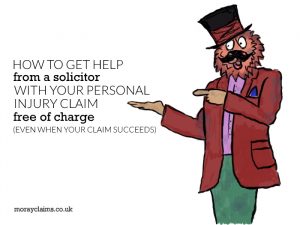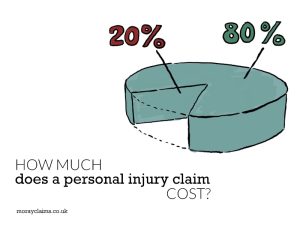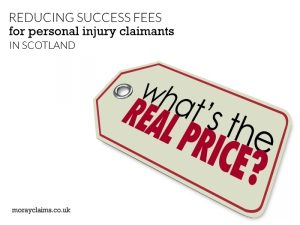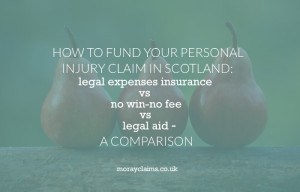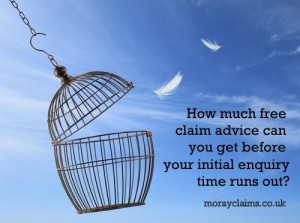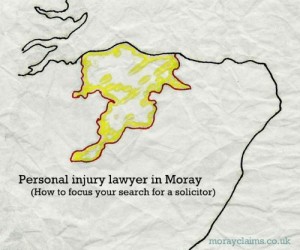It’s natural to be suspicious if someone seems to be offering you something valuable in return for nothing. We are all conditioned to think that if something sounds “too good to be true”, then it must in fact be too good to be true. There are times when we’re vulnerable to letting our guard down – for example, if it’s something we really want – and system tools have evolved to provide some protection. For example, many spam filters will catch emails with “free” in the subject line because use of that one word alone indicates dodgy intentions on the part of the sender. But just because a service is offered as 'provided free of charge' to you, it's not necessarily dodgy as long as the service provider is getting by some other method - such as happens with solicitors working for claimants with personal injury claims. We invite people to ask us questions via our Google Business page. You can ask a question of Moray Claims on Google Business here. You can see the questions Continue Reading
Legal Aid Articles
Below you can find a list of our articles dealing with the operation of Legal Aid in Scotland in relation to personal injury claims.
How Much Does A Personal Injury Claim Cost?
Your solicitor’s aim is to maximise the amount of compensation you receive for your injuries and other losses. The “top line” value of your claim needs to be as high as possible, but that’s not all. You also want to try to reduce the amount you will lose in having to pay legal fees from your compensation. For most people who become a personal injury client of Moray Claims / Grigor & Young, you will lose 10 per cent of your compensation in paying what is called a "Success Fee". In a minority of cases, though, no deduction will apply at all. The basic difference is between claims covered by legal aid (no deduction ever) and claims we deal with on a no win-no fee basis (10 per cent deduction in most cases and, rarely, 20 per cent). So , how much does a personal injury claim cost? And how can you minimise what you will have to pay out of your damages? As we will see, it can mean the difference between receiving 100% of your compensation and only 80% - and the Continue Reading
Why it is best to get your choice of personal injury solicitor right first time
Filmmakers have a wide variety of camera techniques at their disposal to help them tell their story to best effect. One of the most powerful tools directors can employ is the split diopter lens, which makes it possible to have two subjects at different distances in the frame simultaneously – and both in focus. In his 1951 film, Strangers on a Train, Alfred Hitchcock wanted a telephone to be in a foreground close-up while actors in the background remained in focus. This was to emphasise the importance of the incoming phone call. The limitations of camera lenses at the time meant he could not make it work. He fixed the problem by having a giant phone in the foreground and putting a regular-sized phone in Ruth Roman’s hand as she came to answer it. The camera view tilted up as she approached (moving the monster phone out of shot). The 1984 film comedy, Top Secret, spoofed that set-up, with the foreground telephone remaining in shot throughout and the army officer Continue Reading
Reducing Success Fees paid by Scottish personal injury claimants
Success fees are the “hidden cost” of personal injury claims. They reduce the amount of compensation you receive from a personal injury claim after that compensation figure has been fixed and paid. Success fees are fees that are paid out of compensation (awarded or agreed) by successful personal injury claimants to their solicitors or claims management companies under a success fee agreement. In this article, we will look at how the Scottish Government wishes to regulate the maximum levels of success fee that can be charged – to provide a better financial outcome for injured people than they often get at present. First of all, in order to understand the context in which this is all happening, we need to look at wider changes that will soon affect Scottish personal injury claims. The Scottish Government intends to change the way personal injury claims are run in Scotland. This follows similar changes brought in in England and Wales. One big proposed change is to reduce Continue Reading
Why it matters if you have a contribution for Civil Legal Aid
One of the ways to fund a personal injury claim is by means of legal aid. Advice and assistance is available to cover the preliminary work, including intimating the claim and negotiating with the third party or their insurers. If the negotiations break down for any reason, you will need to raise a court action if you are going to achieve a fair settlement of your claim. Under legal aid, you need to apply for Civil Legal Aid, which requires various forms to be completed. This includes providing details and vouching of your income and capital. The application is then submitted to the Scottish Legal Aid Board (SLAB) via an online system. SLAB have various tests they apply in determining whether civil legal aid should be granted. This includes such things as: the value of the claim (and whether this is significantly in excess of any offers that have been made already to settle your claim); the prospects of success (anything less than 50% chances of success is going to Continue Reading
A Comparison Of Personal Injury Claim Funding Methods: No Win-No Fee vs Legal Aid vs Legal Expenses Insurance
In theory, you could run your Personal Injury Claim on a private fee-paying basis. You would have to pay your solicitor interim fees as the case progressed. You would have to pay for all outlays, including recovery of medical records and payment of expert witness fees. If your case went to Court, you would have to bear a hefty risk. Lose your case and you will not only have to pay the fees and outlays of your own solicitor; you will also be responsible for paying the fees and outlays of the opposing solicitor. Depending upon the complexity of the case and which Court any action is raised in, your legal bill would certainly be thousands of pounds and might be tens of thousands of pounds. Unless you have bottomless financial resources (in much the way that insurance companies do) private fee paying arrangements for personal injury claims are generally reckoned to be “a bad idea”. You need to be able to run your claim in a way which costs a lot less and carries a lot less Continue Reading
Personal Injury Claim First Enquiries – How Much Scope For Free Advice?
We end most articles on this blog with a call to action along the lines of “get in touch if you have any questions – all initial enquiries are free”. We’ve received a request for clarification of this. The question came via email - “When is a contract deemed to have started after first enquiry?” I take that to mean: at what point do you get beyond the point of initial enquiry, where everything is "without obligation", and get bound into taking things further with that particular solicitor? With personal injury claim first enquiries, how much scope for free advice do you have? We handle most personal injury claims in one of two ways here and I will try to explain what happens in each case (there's a general summary, below, if you want to skip to that). Legal aid cases If you qualify for some form of legal aid, we will encourage you to sign up for legal advice and assistance, which is the initial form of legal aid, covering meetings, correspondence and Continue Reading
Personal Injury Lawyer In Moray (How To Focus Your Search For A Solicitor)
If you live in Moray or have been injured in an accident which happened in Moray, here are some factors to consider if you need to choose a solicitor to help you with a personal injury claim. Are you going to use a local solicitor or one who is at a distance from you? A Moray solicitor will have local knowledge, which could be useful and give them an advantage over someone who is not based in the area. For some types of accident - for example, pavement tripping accidents - it can be crucial for someone (often, the solicitor!) to visit the locus of the accident as soon as possible after the accident in order to take photographs and make measurements. A local solicitor is going to be better-placed to carry out such work. Or maybe not. Google Streetview and other free online tools mean that a virtual visit to a locus is often possible and this may be sufficient, depending upon the type of accident. So, it may not be essential to have a local solicitor to deal with your Continue Reading
Legal Aid for Personal Injury Claims in Scotland
These days, much of the focus is on “no win – no fee” arrangements but, in Scotland, civil legal aid is still available for personal injury claims. At Moray Claims / Grigor & Young about 50% of our personal injury caseload is covered by some form of legal aid. The First Stage of Your Claim – Advice & Assistance The initial stages of a claim can be covered by legal advice and assistance, a form of legal aid which allows work to be done in investigating the claim, including obtaining medical evidence, negotiating with the opponent and settling the claim if possible. The Scottish Legal Aid Board’s website has a calculator which allows you to check your likely eligibility for legal advice and assistance. Some people qualify fully, some not at all and, in the middle, some qualify but with the need to pay a financial contribution. Despite this, at Moray Claims / Grigor & Young, we never require payment of any advice and assistance contribution to be made. Your Continue Reading
